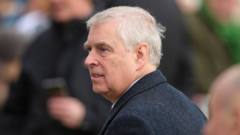In a recent statement, Prince Andrew's office confirmed that he "ceased all contact" with a businessman identified only as H6, who is currently accused of being a Chinese spy. This decision follows guidance received from government officials amidst ongoing scrutiny regarding the prince's judgment and affiliations. The duke had originally met H6 through "official channels," with assurances from his office that discussions never involved sensitive matters.
The British semi-secret national security court has labeled H6 a "close confidant" of Prince Andrew, which has raised eyebrows regarding the nature of their relationship and the implications it may have for national security. The court's ruling, which upholds a ban against H6 entering the UK, suggests he poses a risk to the nation's security due to his attempts to leverage Andrew's influence in sensitive dealings, particularly in relation to potential investors from China.
H6's appeal against this exclusion was rejected, with the judges citing substantial evidence that he had been under investigation by intelligence agencies for potentially attempting to establish undue influence over a member of the Royal Family. During a prior investigation in November 2021, authorities confiscated electronic devices from H6 that contained information alarming enough for MI5 to classify him as a threat, leading to his exclusion from the UK.
The involvement of H6 with Prince Andrew has been scrutinized further in light of a letter found on H6’s devices revealing that he was authorized to negotiate business deals on the prince's behalf. Notably, the correspondence implied that H6 held significant sway within Andrew's circles during a tumultuous time for the duke, potentially making him vulnerable to manipulation.
Critics, including former officials from national security, have voiced concerns about H6's connections to the United Front Work Department (UFWD), a segment of the Chinese Communist Party (CCP) that pursues influence operations internationally, including in the UK. The Home Office supports these claims, suggesting H6 was engaged in covert maneuvers that could threaten both national and international security by exploiting Prince Andrew's position.
China's embassy in the UK has refuted all espionage claims, asserting that allegations against individuals like H6 are politically motivated fabrications aimed at discrediting China and hampering bilateral exchanges. This backdrop highlights the complexity of international diplomacy, the safety of royal members, and the broader implications of espionage allegations amid escalating tensions between the West and China.
While Prince Andrew's office has refrained from commenting extensively on national security issues, the prince’s legacy continues to be shadowed by scrutiny over questionable networks and associations. As he distanced himself from H6, the conversation around the responsibilities and risks associated with royal relationships and political interference remains pertinent in contemporary discourse.
The British semi-secret national security court has labeled H6 a "close confidant" of Prince Andrew, which has raised eyebrows regarding the nature of their relationship and the implications it may have for national security. The court's ruling, which upholds a ban against H6 entering the UK, suggests he poses a risk to the nation's security due to his attempts to leverage Andrew's influence in sensitive dealings, particularly in relation to potential investors from China.
H6's appeal against this exclusion was rejected, with the judges citing substantial evidence that he had been under investigation by intelligence agencies for potentially attempting to establish undue influence over a member of the Royal Family. During a prior investigation in November 2021, authorities confiscated electronic devices from H6 that contained information alarming enough for MI5 to classify him as a threat, leading to his exclusion from the UK.
The involvement of H6 with Prince Andrew has been scrutinized further in light of a letter found on H6’s devices revealing that he was authorized to negotiate business deals on the prince's behalf. Notably, the correspondence implied that H6 held significant sway within Andrew's circles during a tumultuous time for the duke, potentially making him vulnerable to manipulation.
Critics, including former officials from national security, have voiced concerns about H6's connections to the United Front Work Department (UFWD), a segment of the Chinese Communist Party (CCP) that pursues influence operations internationally, including in the UK. The Home Office supports these claims, suggesting H6 was engaged in covert maneuvers that could threaten both national and international security by exploiting Prince Andrew's position.
China's embassy in the UK has refuted all espionage claims, asserting that allegations against individuals like H6 are politically motivated fabrications aimed at discrediting China and hampering bilateral exchanges. This backdrop highlights the complexity of international diplomacy, the safety of royal members, and the broader implications of espionage allegations amid escalating tensions between the West and China.
While Prince Andrew's office has refrained from commenting extensively on national security issues, the prince’s legacy continues to be shadowed by scrutiny over questionable networks and associations. As he distanced himself from H6, the conversation around the responsibilities and risks associated with royal relationships and political interference remains pertinent in contemporary discourse.


















